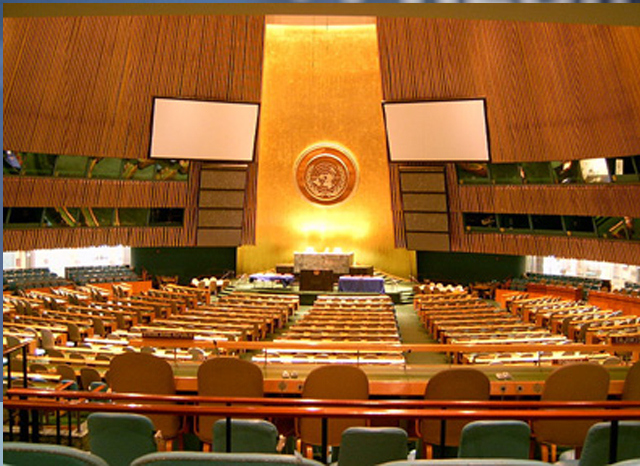From Cornell International Affairs Review VOL. 5 NO. 1The Problems With American ExceptionalismAn example of this phenomenon is when the US government went to war with Iraq in 2003. Multilateral organizations, such as NATO and the United Nations––both of which are mostly made up of American allies––did not support the proposed invasion of Iraq, but the US disregarded their opinions and went to war anyway. Kofi Annan––the United Nations Secretary-General at the time––said the war in Iraq violated the UN Charter, designed to achieve international cooperation, and that all UN members are bound to follow. In spite of this, the UN never formally punished the US government for violating the Charter, and to this date, the US still has troops in Iraq.17 The United States’ unilateral act was a dangerous precedent because it challenged the UN’s authority with regards to international law: it made it so that other nations can use the Iraq war as an exemplar for why they should be able to go to war without the UN or NATO’s approval. In going against the UN and NATO––two multilateral organizations designed to promote world stability––the US is essentially implying that the decision to go to war should be a country’s decision alone, and that an international consensus is no longer needed. If a smaller, less influential country––such as North Korea in 200918––had violated the UN charter and committed military actions despite international objections, then that country would have been imposed with sanctions. However, even though both America and North Korea violated the UN Charter, the US didn’t face any punishment because of its influential role in global politics. The US has also rejected the Ottawa Treaty. This multilateral agreement––signed by 157 different countries––bans the use and further development of landmines. The US has not signed the treaty despite the fact that it owns one of the largest landmine arsenals in the world.19 By not signing the Ottawa Treaty, which protects not only soldiers but civilians as well, the US runs the risk of portraying itself as uncooperative in the promotion of world peace. Not many agreements have more international backing than the Kyoto Protocol and the Ottawa Treaty, which suggests that most countries believe they provide worldwide benefits. The US, by choosing not to sign these popular treaties for whatever reason, is thus taking a stance that favors its own interests instead of supporting a global compromise. This lack of international cooperation, supposedly justified by America’s so-called “exceptional” status, has irritated other countries’ citizens who reject the notion of a world dominated by the US Kim Campbell––the former Prime Minister of Canada––noted her irritation with the idea of US superiority in an interview last January.20 When asked how people from other countries view the idea of American exceptionalism, her response was, “dimly.”21 While the people of the US are free to believe that their country is “exceptional,” they have to understand that the perception of such a status is not for them to choose. American politicians may tout American exceptionalism and incorporate its ideology into domestic policies. Nevertheless, they cannot claim what Governor Christie did: other nations “aspire to be” the US if foreign opinion is to the contrary. Even though the US plays an influential and important role in global politics, Campbell’s response provides evidence supporting the notion that American superiority is solely an American idea. If the US were truly looked upon as being an “exceptional” nation, then the UN and NATO would not have opposed the invasion of Iraq in 2003. American allies who did not go to Iraq–– France, Germany, and Turkey––probably would have followed the US, and would have participated in the War out of fear that if they did not, then they would lose an alliance with a superior nation. If the US were actually an exceptional country, then the Kyoto Protocol and the Ottawa Treaty would not be effective or have respected legitimacy among the international community since they do not have US involvement. If other countries actually did view the US as superior, then they would attempt to mimic American domestic policies, such as health care. However, it is the other way around. In March of 2010, after President Obama passed his healthcare reform bill, French President Nicolas Sarkozy –– addressing Columbia University students in New York –– said, “Welcome to the club of states who don’t turn their back on the sick and the poor.”22 Sarkozy’s claim shows that, at least in some respects, US policies are not seen with the same enthusiasm abroad that they are met with at home.23 It is not only foreign heads of state that will not adhere to the idea of American superiority, as many foreign citizens do so as well. Several weeks before the proposed invasion of Iraq–– February 15, 2003––an estimated six to ten million people, in sixty different countries, expressed their opposition to the United States’ foreign policy.24 This global opposition to the war showed that there are millions of international citizens who reject the notion of American exceptionalism.25 If these foreigners did accept the view that America is exceptional, then they would have allowed the US to do as it wished instead of voicing disapproval for the nation’s unilateral actions. Even though the US went to war with Iraq––in spite of tremendous international objection––this action still does not support the view of American eminence. Excessive national pride... causes arrogance and makes people believe that one’s nation is exempt from established ethical norms. In October of 2011, President Obama announced that virtually all US troops will withdraw from Iraq by the end of the year. In the eight years between the start of the invasion and this announcement, 54 different countries have officially condemned the US for its actions in Iraq. While many of these nations were against the war from the beginning, one of its main initial foreign supporters, Tony Blair––the former Prime Minister of the United Kingdom––publicly expressed “regret” in regards to the invasion at Britain’s public Iraq Inquiry26. While proponents of unilateralism may scoff at these condemnations and regrets, this formal international opposition over the United States’ one-sided course of action not only stains America’s credibility and reputation on the global stage, but also discredits the notion that other nations view the US as superior. Although the notion that America, and its policies, are the envy of the world has become a staple of US political campaign ideology, there is no reason to believe that America is an exceptional nation. However, this is not necessarily a bad thing. Former Prime Minister Kim Campbell raised such a point when she said, “America is a great country… but exceptionalism is a very worrisome doctrine because it suggests that you don’t have anything to learn from anybody else, and that you don’t owe anything to anybody else.”27Though a type of nationalist arrogance––the kind that Johannes Rau fought against in his time in office in Germany–– may be prevalent in present-day America, those who believe in American exceptionalism need to understand that such a self-congratulatory view is counterproductive and alienates the US from other nations. While the US may be a powerful and influential country, people need to realize that it is not an achievement to be an American. Many countries in Europe and Asia have surpassed America when it comes to quality of education, healthcare, and even seemingly primitive issues, such as infant mortality. Americans should learn from these nations’ successes and cooperate with them on global affairs instead of holding the singleminded view that the American way is always the best. Though the current political climate in the United States may not be favorable to a politician who points out his country’s weaknesses and ways that it has fallen behind, American exceptionalism should be removed from domestic political ideology and discourse. Excessive national pride is a dangerous thing, as it causes arrogance and makes people believe that one’s nation is exempt from established ethical norms. The American people need to understand that when countries work together to create multilateral universal rules, like the UN Charter, they do so in order to strengthen the bonds between nations, not weaken them. Though President Obama is noted for being the only President to publicly use the phrase “American exceptionalism,” he raised an important point on the matter later on in his 2009 speech for NATO’s 60th anniversary: and I think that we’ve got a whole lot to offer the world does not lessen my interest in recognizing the value and wonderful qualities of other countries, or recognizing that we’re not always going to be right, or that other people may have good ideas, or that in order for us to work collectively, all parties have to compromise and that includes us. And so I see no contradiction between believing that America has a continued extraordinary role in leading the world towards peace and prosperity and recognizing that that leadership is incumbent, depends on, our ability to create partnerships because we create partnerships because we can’t solve these problems alone.” If this statement holds true, then the US government will be scaling down its notion of American exceptionalism in the future, and will thus, in return, be a stronger nation. Endnotes
Photos courtesy of:
Suggested Reading from Inquiries Journal
Inquiries Journal provides undergraduate and graduate students around the world a platform for the wide dissemination of academic work over a range of core disciplines. Representing the work of students from hundreds of institutions around the globe, Inquiries Journal's large database of academic articles is completely free. Learn more | Blog | Submit Latest in Political Science |
















